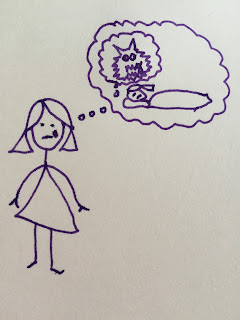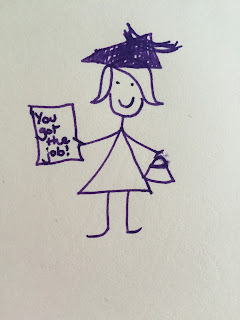I recently spoke to a group of senior leaders at work about resilience in my definition of the term. More to come on that in another post. During my talk, I mentioned how bad things had been last year and how things still were, quite often, very very bad for me with depression and anxiety invading and dictating various aspects of my life – what was possible and impossible. I told the group that at my lowest ebb I had not been suicidal, meaning I had not made plans to kill myself or set about putting those plans into practice. What had happened to me, though, was something very damaging: I had stopped wanting to live. I awoke each day with a heavy head as I looked out of the window at a world I no longer wanted to be part of. I felt a total failure, despite the promotions, the new job, the happy marriage, the friends I had. I felt awful. I felt I was awful, and that feeling this terrible way each day was my life sentence, a sentence I wanted to give up.
Nothing if not practical, I eventually realised that the tears every day before work and the panicked feeling that I couldn’t shake no matter how much exercise I did, sleep I got, reading or other distraction techniques I employed, the feelings of absolute hopelessness, were not going away, and that I had to do something about it. I chose to see my psychiatrist and explain how I felt. He made me fill out a questionnaire to assess the severity of my depression, and as I circled ‘very frequently’ against ‘feeling of not wanting to be alive’ I started to cry and cry, realising when I saw my self-assessment on paper just how bad things really were. I was dreadfully ill. I was living not even a half-life, even though from the outside every aspect of it was going well.
And this is how to interpret...
Mind puts it like this:
Mixed feelings
You may be very clear that you want to die – or you may simply not care if you live or die. However, for most people, suicidal thoughts are confusing. As much as you want to die, you may also want a solution to your difficulties. You may want others to understand how you feel and hope that they can help. Yet, you may not feel able to talk to anyone who offers to help. Having such mixed feelings and being unsure about what to do can cause great anxiety.
The latter description is more relevant to me – I just did not care whether I lived or died. But I did want a solution and I did want others to understand.
In hospital I met many other patients who were stuck and wading through the treacly mess of depressive thoughts. Looking into the treacle to try to find meaning, but seeing only blackness. Trying to get out of the treacle, but being sucked back into its sticky, strong mass that we had not the means to counterattack.
One patient who became my friend was very silent almost the entire time that I was there. Many more were like him. I was pretty well versed in the language of therapy and (no surprises here) had always been something of a talker, but others, particularly men but not exclusively, were so immersed in the terrible depths of their illnesses, so entrapped, that their mouths and gestures were glued shut and slowed by the treacle. And even if they opened their mouths to speak, many times they had no language to say what was going on.
You may be aware that more men commit suicide than women, by which I mean that more men succeed in the attempt. It is always dangerous to make generalisations, but the rates of suicide among men are rising over the past few years, whereas for women they have stayed broadly the same. Wikipedia says: “The rate of nonlethal suicidal behavior is 40 to 60 percent higher in women than it is in men. This is due to the fact that more women are diagnosed as depressed than men, and also that depression is correlated with suicide attempts.”
The Guardian says: “The Adult Psychiatric Morbidity in England 2007 survey found that 19% of women had considered taking their own life. For men the figure was 14%. And women aren’t simply more likely to think about suicide – they are also more likely to act on the idea. The survey found that 7% of women and 4% of men had attempted suicide at some point in their lives. But of the 5,981 deaths by suicide in the UK in 2012, more than three quarters (4,590) were males“
As I have said before, I am not a doctor and have no qualifications in this field other than the benefit of my own lived experience.
I personally believe that we need to do more to support each other – whether we are struggling or not – to prevent ourselves and others potentially struggling to the extent that life ceases to be enjoyable. Even for me, while I may (may, no proof) be genetically predisposed to depression and therefore have life’s experiences + genes to thank for my seemingly effortless propensity to become depressed through various times in my life, life can be enjoyable and often is. I am so lucky that I have people who ask me ‘Are you okay?’ and really mean it.
The hardest thing for me about feeling so dreadful was the loneliness of it. And I talked about it as it was happening to my husband and my doctor, and still I felt alone. What must it be like to be someone who is experiencing these terrifying thoughts that a world without them in it would be a better reality than one with them?
We cannot move mountains to end all suicides today. But we can do little things to connect ourselves to one another and seek to invite connection from others, so that people feel that they are not alone, and that someone – a lot of someones, in fact – cares for them. We can ask each other how we are, not as a throw away ‘hello’ platitude, but as a real question expecting (and accepting) a real answer.
We can ask about each other’s lives and share something of our own, so that we make connections with each other. We can smile at the person we meet out running and wish them a good morning. That might be the only time that person sees a smile or hears that all day. Simple steps like these can be very powerful. And at the end of the day, we can say thank you to our work colleagues for what they have done for us. We can ask them what their evening or weekend plans are, and listen and share our own. We can thank our friends or partners for helping with dinner (whether ordering Domino’s or cooking a three course meal, whatever!).
By connecting ourselves with others and by sharing things about ourselves, especially if we are not having a good day and we feel we can say it aloud, we are inviting others to do the same. So when I next ask you how you are, or how things are, or if I ask, “Are you okay?” I promise: I really want to know the answer.



























